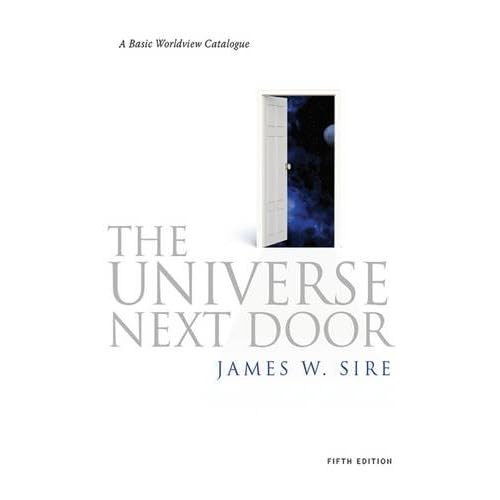James Sire (Buy on Amazon)
James Sire, a Christian author, has developed a fifth edition of ‘a basic worldview catalogue’; The Universe Next Door (2009). Everyone has a worldview, he explains, whether you know it or not. In the first chapter, an explanation of the term 'worldview' is given; something that we all need to know and that has, admittedly by Sire, been ever changing through time. Indeed, Sire reflects on the standpoint of the world in the twenty first century by comparing two poems:
One of Stephen Crane’s, written in 1899,
A man said to the universe:and a Psalm (Psalm 8) from the Bible which begins and ends,
“Sir, I exist.”
“However,” replied the universe,
“The fact has not created in me
A sense of obligation.”
O Lord, our God,
How majestic is your name in all of the earth!
This shows how far society today has changed from that of societies past and Sire sets out to show how the many worldviews of today have ‘developed from a breakdown in the theistic worldview’. He states that any worldview thinkable, of which there are millions, come from one of the eleven worldviews in this book, including naturalism, New Age, nihilism and Islamic theism. He goes on to propose that these eleven are all simply variations on theism, different progressions from the result of rejecting the idea of God.
He uses eight propositions (or questions) to look at the worldviews which he claims will express each worldview, including: what is prime reality?; what is a human being?; what happens to a person after death?; how do we know what is right and wrong?. The questions are very helpful to compare each worldview to each other and to your own, although are sometimes set out in a confusing way (eg. Worldview question 1 may be under point 3 or mixed with question 5 under point 7...).
One of the main aims of the book is ‘to encourage us all to think in terms of worldviews, this is, with a consciousness of not only our own way of thought but also that of other people, so that we can first understand and then genuinely communicate with others in our pluralistic society’. This, says Sire, is necessary for us to be ‘fully conscious intellectually’ and is a noble cause, as so often is there division due to ignorance and misunderstanding of peoples’ views on life.
An additional question in this fifth edition is ‘what personal, life-orienting core commitments are consistent with this worldview?’. This adds an emphasis to how consistency of life with a worldview is important, the fact that worldviews should affect the actions of a person. Throughout the book, Sire questions whether a person can truly be consistent with the worldview being discussed, whether the worldviews themselves do even make sense in themselves. A recurring theme is the idea of value of life and Sire ponders in the final chapter whether there can be value in life in any worldview at all, apart from theism.
This conclusion that theism is the superior worldview in a ‘worldview catalogue’ that should be unbiased has received criticism. However, the book itself is tribute to the fact that there is ‘no such thing as an unbiased study of any intellectual idea or movement’. This criticism is a misunderstanding of the book: a worldview must affect the actions and life of the person. There is no non-worldview worldview!
Sire reposts his critics that this is an example of a Christian’s guide to the Christian worldview and its alternatives, something possibly more valuable than a completely objective view. The Universe Next Door is a valuable resource for this reason; it gives a clear and thorough (to the point of overwhelming at times) explanation of the worldviews of the twenty first century from a person who understands what a worldview truly is. Sire doesn’t hide away from the fact that he has his own worldview and encourages his readers to investigate and understand their own.
This book isn't simply a comparison of religions but is an exploration of philosophy, psychology and sociology. I’d recommend this book for anyone who is interested in different views of reality and the world, who want to understand their own worldview and those of others they know and especially for Christians who want to understand people with different views to their own.


Hmm, I had a copy of this book. I loaned it to Louie before I had a chance to read it. I think I'll have to get it back! Great post Joel!
ReplyDelete